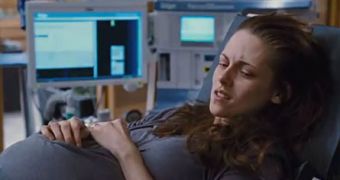“Breaking Dawn Part 1” may be one of the hottest releases of this year, but it also proves to be a bit too much to handle for certain members of the audience. At least two men blacked out so far during screenings of the film.
Jokes about how they passed out because of what they were seeing onscreen or that they were simply trying to come up with a way of getting out of the screening they'd been dragged to, might seem to write themselves, but The Hollywood Reporter says it wasn't the case.
Apparently, it was the birth scene that caused them to black out, when Bella (Kristen Stewart) delivers her half mortal half vampire child that has been eating at her from the inside.
One man from California simply dropped down and went into convulsions.
“He was convulsing, snorting, trying to breathe. He scared me big time,” his girlfriend explains.
The man says he is no longer interested in how the film ends, though moviegoers with him when this happened will certainly disagree: the screening ended when ambulance arrived on the scene.
Another man, this time in Salt Lake City, experienced similar symptoms, during the same violent scene, which also includes powerful flashes of light.
“I didn't really remember what happened after that. I think I blacked out. According to [my wife] I was shaking and mumbling different noises,” says the second moviegoer.
Scared, his wife did the only thing that came to her mind until help arrived. “I was kneeling in front of him and slapping his face,” she explains.
Experts believe both men suffered an attack of photosensitive epilepsy, triggered by the aforementioned flashes of light in rapid succession.
“It's like a light going off because it hits your brain all at once. The trouble with theaters is that they're so dark, the light flashing in there is more like a strobe light,” Dr. Michael G. Chez explains.

 14 DAY TRIAL //
14 DAY TRIAL //